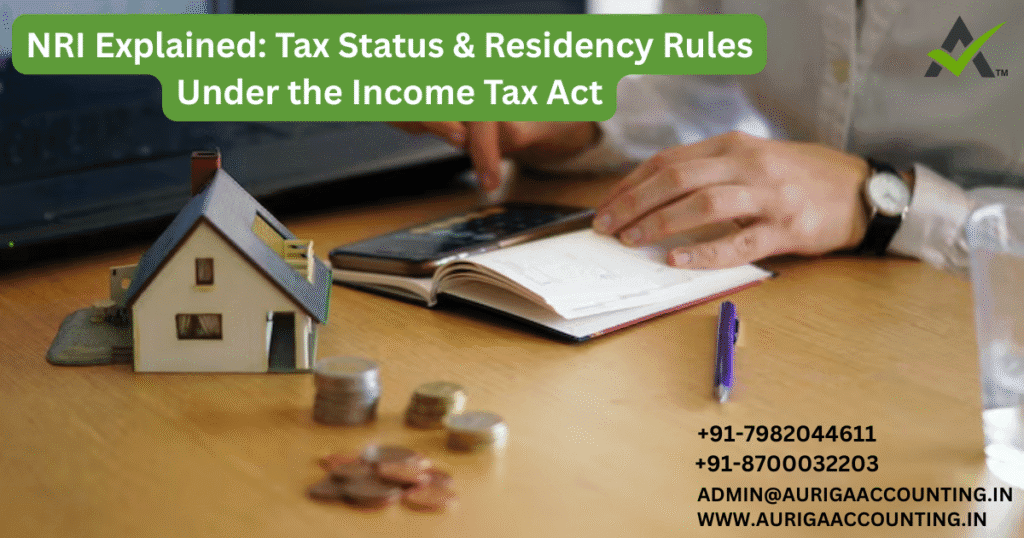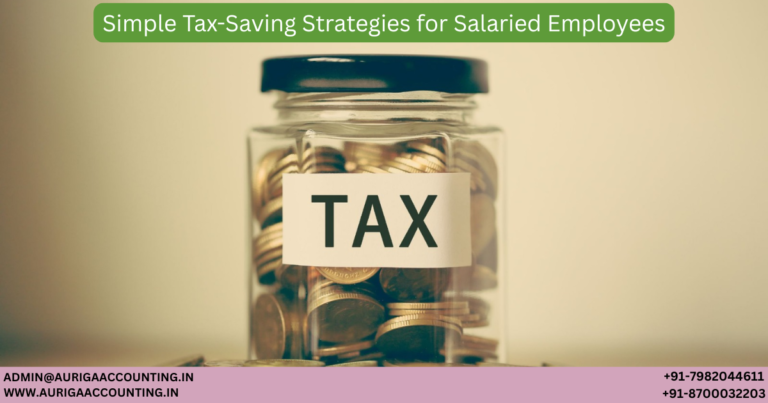An individual of Indian origin residing outside India is classified as a Non-Resident Indian (NRI). The Income Tax Act, 1961, sets out separate tax provisions for residents and NRIs, with specific criteria to determine an individual’s residency status. A person is treated as a resident for tax purposes if they stay in India for a defined duration during a financial year. This article provides an overview of NRI classification, related tax implications, and introduces the concept of Resident but Not Ordinarily Resident (RNOR).

NRI Explained: Tax Status & Residency Rules Under the Income Tax Act
Introduction
ToggleRules Governing NRI Status in India
In India, the status and obligations of Non-Resident Indians (NRIs) are primarily governed by two key legislations:
Income Tax Act, 1961 – Determines the tax liabilities based on residential status.
Foreign Exchange Management Act (FEMA) – Regulates foreign exchange transactions, investments, and bank accounts held by NRIs.
Importantly, the definition of “NRI” differs under these two laws. This guide focuses on NRI classification and tax implications under the Income Tax Act.
Determining Residential Status for Taxation
To determine your tax liability in India, it is crucial to establish your residential status for each financial year. This status must be evaluated annually, as it can vary based on your travel patterns, employment status, or changes in where you live.
For instance, if you qualify as a non-resident in one year, your status may change in the following year if your time spent in India increases or your circumstances shift. Since your residency status directly affects how your income is taxed, it’s important to reassess it every year.
Before we delve into who qualifies as a Non-Resident Indian (NRI), let’s first understand the criteria for being considered a Resident Indian under the Income Tax Act
Who Qualifies as a Resident in India for Tax Purposes?
Under the Income Tax Act, an individual is treated as a Resident of India for a financial year if they meet either of the following conditions:
182-Day Rule: The person has stayed in India for 182 days or more during the financial year.
OR
60-Day and 365-Day Rule:
The person has stayed in India for at least 60 days during the current financial year and has spent a total of 365 days or more in India over the four preceding financial years.
Resident Status for Indian Citizens Working Abroad
If you are an Indian citizen who leaves the country for employment abroad or to work as a crew member on an Indian ship, you will be treated as a Non-Resident Indian (NRI) for tax purposes if your stay in India during the previous financial year is less than 182 days.
In other words, spending 182 days or more outside India qualifies you as an NRI under the Income Tax Act.
Resident Status for Indian Citizens and Persons of Indian Origin (PIOs)
An Indian citizen or a Person of Indian Origin (PIO) who ordinarily resides outside India but visits India during the financial year will be considered a resident for tax purposes if:
Their total income (excluding foreign income) exceeds ₹15 lakh,
ANDThey meet either of the following conditions:
Stayed in India for 182 days or more during the financial year,
ORSpent 120 days or more in India in the financial year and a total of 365 days or more in the four years immediately preceding it.
Deemed Resident Status for Indian Citizens
In certain cases, residency is determined by “deemed resident” rules, even if the standard residency conditions are not met.
An individual will be treated as a deemed resident of India if they:
Are a citizen of India,
Have a total income exceeding ₹15 lakh (excluding foreign-sourced income), and
Are not liable to pay tax in any other country due to domicile, residence, or any similar reason.
Non-Resident Status in India
An individual is classified as a Non-Resident Indian (NRI) if they do not satisfy the conditions to be considered a resident.
In general, a person qualifies as an NRI if their stay in India is less than 182 days during the financial year
Residential Status of Indian Citizens Working as Crew Members on Indian Ships
Indian citizens employed as crew members on Indian ships have a distinct method for calculating their stay in India for tax purposes.
Key rules include:
Exclusion of Voyage Days:
The number of days spent outside India is determined by the start and end dates in the Continuous Discharge Certificate (CDC), as per the Merchant Shipping Rules, 2001.Qualifying Voyages:
The CDC must be issued for voyages that:Start from an Indian port and end at a foreign port, or
Start from a foreign port and end at an Indian port.
Applicability:
These rules are effective from April 1, 2015, and apply to the financial year 2015–16 onward.Tax Implication:
Crew members are considered NRIs for tax purposes if they spend less than 182 days in India during the financial year.Special Consideration:
The entire duration stated in the CDC is excluded from the calculation of days in India—even if the ship operates within Indian coastal waters.
The count of days outside India starts only after the ship crosses India’s coastal boundaries.
Relevance for Visiting Indian Citizens and PIOs
For Indian citizens or Persons of Indian Origin (PIOs) living abroad, this exclusion ensures that longer visits to India (over 2 months) do not automatically trigger resident taxation status, provided they meet the applicable NRI conditions.
Other Residential Categories: RNOR
In addition to Resident and Non-Resident Indian (NRI), there is a third classification:
Resident but Not Ordinarily Resident (RNOR).
An individual returning to India after extended residence abroad may qualify as RNOR, which offers favorable tax treatment:
Income earned outside India is not taxable.
Income earned within India remains taxable.
This status is typically granted for a limited period upon returning to India and helps ease the transition back into the Indian tax system.
Who is a Resident but Not Ordinarily Resident (RNOR)?
An individual qualifies as a Resident but Not Ordinarily Resident (RNOR) for a financial year if they meet any of the following conditions:
Previous Non-Resident Status:
They were a Non-Resident Indian (NRI) in 9 out of the 10 financial years preceding the relevant year.Limited Presence in India:
They were present in India for 729 days or less during the 7 financial years before the current year.Indian Citizens or PIOs Visiting India:
They are a citizen of India or a Person of Indian Origin (PIO) visiting India.
Their total income exceeds ₹15 lakh (excluding foreign income).
They stayed in India for 120 days or more but less than 182 days during the financial year.
Deemed Resident without Global Tax Liability:
They are an Indian citizen.
Their total income exceeds ₹15 lakh (excluding foreign income).
They are not liable to pay tax in any other country or territory due to domicile, residence, or similar reasons.
Taxation Rules for NRIs
Income earned in India is taxable in India.
Foreign income (earned outside India) is not taxable in India.
Special Note for Seafarers:
Salary earned on foreign ships for services rendered outside India is not taxable in India.
Even if the salary is credited to an NRE account in India, it remains non-taxable, provided the seafarer spends less than 182 days in India during the financial year.
Taxation for RNORs
If you have recently returned to India after being an NRI, you may qualify as an RNOR for up to 3 financial years.
As an RNOR:
Income earned in India is taxable.
Foreign income is not taxable in India, similar to NRI treatment.
This transitional status provides tax benefits for returning NRIs, allowing time to reorganize finances before becoming fully resident.
Transition to Full Resident Status
Once you no longer qualify as an RNOR and become a Resident and Ordinarily Resident (ROR):
Your global income, including foreign earnings, becomes fully taxable in India.
However, relief may be available under Double Taxation Avoidance Agreements (DTAA) with the country where the foreign income is earned.
New Income Tax Bill 2025: Updated Tax Residency Rules for NRIs
On February 13, 2025, India’s central government introduced the Income Tax Bill 2025, which will take effect from April 1, 2026. These changes bring significant updates impacting Non-Resident Indians (NRIs), Persons of Indian Origin (PIOs), and frequent visitors to India.
Revised Tax Residency Criteria
Under the new legislation, an individual is considered a resident in India if they satisfy any of the following conditions:
1. The 182-Day Rule (Unchanged)
An individual is classified as a tax resident if they stay in India for 182 days or more during a financial year. Those staying less than 182 days remain NRIs.
2. Modified 60-Day + 365-Day Rule
Previously, individuals staying at least 60 days in a tax year and 365 days over the past four years were treated as residents. The new bill introduces key exemptions:
Indian citizens working abroad or crew members on Indian ships are exempt from the 60-day rule.
NRIs and PIOs are exempt if their income earned in India is below INR 1.5 million.
Example: Rahul, an Indian citizen working in the US, visits India for 100 days. Under the old rule, he might be considered a resident, but under the new exemptions, he remains an NRI.
3. New 120-Day Rule for High-Income NRIs & PIOs
For NRIs and PIOs earning INR 1.5 million or more in India, the threshold increases from 60 to 120 days. Such individuals will be classified as Resident but Not Ordinarily Resident (RNOR) if:
They stay in India for 120 days or more in a tax year.
They have spent 365 or more days in India over the past four years.
Example: Raj, an NRI businessman earning INR 2 million in India, visits for 130 days. Under the previous rule, he would be an NRI, but the new rule classifies him as RNOR.
Understanding RNOR Status
RNOR individuals are taxed only on income earned in India; their global income remains exempt. However, staying 182 days or more classifies an individual as a full resident, making worldwide income taxable in India.
Not Ordinarily Resident (NOR) Status
An individual qualifies as NOR if they meet any of these:
Were an NRI for 9 out of the last 10 years.
Stayed 729 days or less in India over the last 7 years.
Are an Indian citizen or PIO earning above INR 1.5 million and stayed between 120 to 182 days in a year.
Example: Nikhil, an NRI who has stayed 500 days in the last seven years, qualifies as NOR. Only his Indian income is taxable; global income is exempt.
Deemed Residency for ‘Stateless Indians’
A new, controversial clause deems Indian citizens earning INR 1.5 million or more in India, but not paying taxes abroad, as tax residents in India—even if they never visit. This targets Indians in tax-free jurisdictions like UAE, Saudi Arabia, or Monaco.
Example: Suresh, an Indian citizen working in Dubai earning INR 2 million from India and not visiting India, will be considered a resident, making his global income taxable in India.
Additional Residency Provisions
Crew Members of Foreign Ships: Special rules apply for counting days spent in India.
Firms, HUFs, AOPs, Trusts: Considered residents unless their management and control lie entirely outside India.
Companies: Considered residents if incorporated in India or if their Place of Effective Management (PoEM) is in India.
Taxation of Foreign Income
Foreign income (income earned outside India) is taxable only if:
The business is controlled from India.
Professional services are rendered through a practice established in India.
Example: Arjun, an NRI earning INR 50 million from a Dubai-based business, is not taxed in India unless the business is managed from India.
Key Takeaways
The 182-day rule continues to be the main test for tax residency in India.
The 60-day rule has been removed for NRIs, crew members of Indian ships, and Indian citizens working abroad.
A new 120-day threshold applies to high-income NRIs earning INR 1.5 million or more in India.
The deemed residency rule targets Indian citizens earning INR 1.5 million or more in India who do not pay taxes in any other country.
RNOR status provides relief by limiting tax liability to Indian income only, exempting global income from Indian taxation.
About the Author
Priya
priya is a skilled writer who excels at simplifying complex legal topics into practical, easy-to-understand guidance. Her work equips entrepreneurs with the essential insights needed to confidently navigate business laws and successfully launch and manage their ventures
February 21, 2026
new
January 10, 2026
January 8, 2026
January 8, 2026
January 8, 2026
January 7, 2026
January 7, 2026
January 7, 2026
January 7, 2026
January 7, 2026
January 7, 2026
January 7, 2026
January 6, 2026
December 31, 2025
December 31, 2025
December 29, 2025
December 29, 2025
December 27, 2025
December 26, 2025
December 26, 2025
December 12, 2025
December 12, 2025
November 29, 2025
November 29, 2025
November 29, 2025
November 28, 2025
November 28, 2025
November 28, 2025
November 27, 2025
November 27, 2025
November 27, 2025
November 26, 2025
November 26, 2025
November 26, 2025
November 25, 2025
November 25, 2025
November 25, 2025
November 24, 2025
November 24, 2025
November 24, 2025
November 24, 2025
November 21, 2025
November 21, 2025
November 19, 2025
November 19, 2025
November 19, 2025
November 15, 2025
November 15, 2025
November 13, 2025
November 13, 2025
November 13, 2025
June 16, 2025
June 13, 2025
June 11, 2025
June 11, 2025
June 10, 2025
June 9, 2025
June 5, 2025
June 5, 2025
June 5, 2025
June 4, 2025
June 3, 2025
May 31, 2025
May 31, 2025
May 28, 2025
May 28, 2025
May 27, 2025
May 27, 2025
May 27, 2025
May 26, 2025
May 26, 2025
May 26, 2025
May 26, 2025
May 26, 2025
May 24, 2025
May 24, 2025
May 24, 2025
May 24, 2025
May 23, 2025
May 23, 2025
May 23, 2025
May 23, 2025
May 23, 2025
May 23, 2025
May 23, 2025
May 22, 2025
May 22, 2025
May 22, 2025
May 21, 2025
May 21, 2025
May 21, 2025
May 21, 2025
May 21, 2025
May 20, 2025
May 17, 2025
May 17, 2025
May 17, 2025
May 17, 2025
May 16, 2025
May 16, 2025
May 16, 2025
May 15, 2025
May 15, 2025
May 15, 2025
May 14, 2025
May 13, 2025
May 13, 2025
May 13, 2025
May 12, 2025
May 12, 2025
May 12, 2025
May 12, 2025
May 10, 2025
May 10, 2025
May 10, 2025
May 10, 2025
May 9, 2025
May 9, 2025
May 9, 2025
May 9, 2025
May 9, 2025
May 8, 2025
May 8, 2025
May 8, 2025
May 8, 2025
May 8, 2025
May 8, 2025
May 8, 2025
May 7, 2025
May 7, 2025
May 7, 2025
May 7, 2025
May 7, 2025
May 7, 2025
May 6, 2025
May 5, 2025
May 5, 2025
May 5, 2025
May 3, 2025
May 3, 2025
May 3, 2025
May 3, 2025
May 3, 2025
April 30, 2025
April 30, 2025
April 29, 2025
April 28, 2025
April 28, 2025
April 28, 2025
April 28, 2025
April 26, 2025
April 26, 2025
April 26, 2025
April 26, 2025
April 26, 2025
April 25, 2025
April 25, 2025
April 24, 2025
April 23, 2025
October 30, 2023
October 30, 2023
October 30, 2023
October 30, 2023
October 28, 2023
October 28, 2023
October 28, 2023
October 28, 2023
October 28, 2023
October 28, 2023
October 28, 2023
October 28, 2023
October 28, 2023
October 27, 2023
October 27, 2023
October 27, 2023
October 27, 2023
October 27, 2023
October 27, 2023
October 27, 2023
October 27, 2023
October 26, 2023
October 26, 2023
October 26, 2023
October 26, 2023
October 26, 2023
RELATED ARTICLES
Key Reasons...
Simple Tax-Saving...
Tax Saving...
Section 80GGA:...
Guide to Income...
How to Verify...
Handling Income...
No posts found












